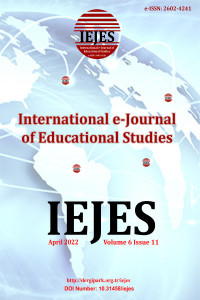Teacher Accountability on Underperforming Schools: An Investigation in Primary Schools around Mapela Circuit in Mogalakwena District
The department of Education (DoE) clearly stated that other South African primary schools are underperforming. The aim of this study was to investigate teacher causes of underperforming schools in Mapela Circuit at Mogalakwena District. Data was also collected from 5 selected primary schools where commonly known by underperforming. Semi-structured interviews which included open-ended questions were included as part of a way of changing school for open communication, to understand how underperforming can make the culture the culture of the school to look very bad. Sampled schools were referred to as a school A, B, C, D and E. The study indicated that lack of resources in the rural schools compare to urban school contribute to the poor performance. The study further indicated that the large number of students prohibit the teachers to pay attention to all learners. The main problem was the impact of teacher accountability on underperforming schools and how it affects the Circuit, District, Province and National. Schools must come with new strategies to improve their performance and the Department of Basic Education must provide the necessary support to schools. The study further recommended the principals, school governing body and teachers to work together to achieve their goal setting in order to close the gaps.
Anahtar Kelimeler:
Accountability, teachers, underperforming schools, learners
Teacher Accountability on Underperforming Schools: An Investigation in Primary Schools around Mapela Circuit in Mogalakwena District
The department of Education (DoE) clearly stated that other South African primary schools are underperforming. The aim of this study was to investigate teacher causes of underperforming schools in Mapela Circuit at Mogalakwena District. Data was also collected from 5 selected primary schools where commonly known by underperforming. Semi-structured interviews which included open-ended questions were included as part of a way of changing school for open communication, to understand how underperforming can make the culture the culture of the school to look very bad. Sampled schools were referred to as a school A, B, C, D and E. The study indicated that lack of resources in the rural schools compare to urban school contribute to the poor performance. The study further indicated that the large number of students prohibit the teachers to pay attention to all learners. The main problem was the impact of teacher accountability on underperforming schools and how it affects the Circuit, District, Province and National. Schools must come with new strategies to improve their performance and the Department of Basic Education must provide the necessary support to schools. The study further recommended the principals, school governing body and teachers to work together to achieve their goal setting in order to close the gaps.
Keywords:
Accountability, teachers, underperforming schools, learners,
___
- Alansari, M., & Rubie-Davies, C. M. (2021). Enablers and barriers to successful implementation of cooperative learning through professional development. Education Sciences, 11(7), 312-318.
- Alvesson, M., & Sköldberg, K. (2017). Reflexive methodology: New vistas for qualitative research. London: Sage Publications.
- Ansell, N. (2015). Shaping global education. International agendas and governmental power. International Development Planning Review, 37 (1), 7-16.
- Farrel, P. (2015). Simple skills for every woman: success in keeping everything together. Oregon: Harvest House Publishers.
- Figlio, D., & Loeb, S. (2011). School accountability. In, E A. Hanushek, S. Machin, and L. Woessmann, (Eds): Handbooks in economics, Vol. 3. The Netherlands: North-Holland.
- Guijt, I. (2020). Accountability and learning: Exploding the myth of incompatibility between accountability and learning. In NGO Management (pp. 339-352). London: Routledge.
- Isa, A. A. (2015). Conflicts in organizations: causes and consequences. Journal of Educational Policy and Entrepreneurial Research (JEPER), 2(11), 54-59.
- Jongbloed, B., Enders, J., & Salerno, C. (2008). Higher education and its communities: Interconnections, interdependencies and a research agenda. Higher Education, 56(3), 303-324.
- Mestry, R. (2013). A critical analysis of legislation on the financial management of public schools: A South African perspective. De Jure, 46(1), 162-177.
- Morris, J., McNaughton, D., Mullins, R., & Osmond, J. (2009). Post-positivist epistemology. Unpublished paper, University of Victoria, Victoria.
- Rehman, A. A., & Alharthi, K. (2016). An introduction to research paradigms. International Journal of Educational Investigations, 3(8), 51-59.
- Shah, S. R., & Al-Bargi, A. (2013). Research paradigms: Researchers’ worldviews, theoretical frameworks and study designs. Arab World English Journal, 4(4), 252-264.
- Tamene, E. H. (2016). Theorizing conceptual framework. Asian Journal of Educational Research, 4(2), 50-56.
- Usman, Y. D. (2015). The impact of instructional supervision on academic performance of secondary school students in Nasarawa State, Nigeria. Journal of Education and Practice, 6(10), 160-167.
- Van Gronigen, B. A., & Meyers, C. V. (2019). How state education agencies are administering school turnaround efforts: 15 years after no child left behind. Educational Policy, 33(3), 423-452.
- Yusof, Y., Roddin, R., & Awang, H. (2015). What students need, and what teacher did: The impact of teacher's teaching approaches to the development of students’ generic competences. Procedia-Social and Behavioural Sciences, 204, 36-44.
- Başlangıç: 2017
- Yayıncı: Tamer KUTLUCA
Sayıdaki Diğer Makaleler
Yeter DURGUN OZAN, Mesude DUMAN, Gözde GÖKÇE İŞBİR
Agrippa Madoda DWANGU, Vimbi MAHLANGU
Comparison of 5th to 8th Grade Mathematics Curricula in Turkey and Greece
Enta ISMAIL AMET, Gül KALELİ YILMAZ
Continuous Assessment in Malawian Primary Schools: An Effective Policy on Paper
Management of Students in Islamic Boarding Schools
Hardianto HARDİANTO, Eddy SETYANTO, Ayu WULANDARİ
Lebelo DİMAKSTSO, Alfred MODİSE, Ngobeni THEMABA
Character Education Human Nature Based-Curriculum in Science Learning of Primary School
Fuat ISKANDAR, Bedjo SUJANTO, M Syarif SUMANTRİ
The Difficulties and Educational Stress of Nursing Students in Clinical Practice during the Covid
